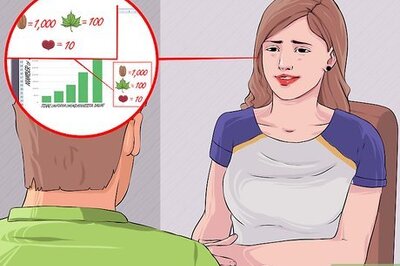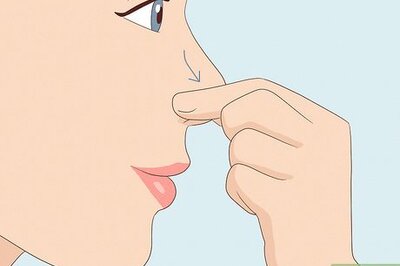
views
Amman: Syrian security forces killed at least 14 civilians in attacks on tens of thousands of protesters who marched against the rule of President Bashar al-Assad on the first Friday of the Muslim fasting month of Ramadan, activists said.
Local Coordination Committees, an activists' organisation, said seven of the protesters were killed in the capital's eastern suburb of Erbin, one in Mouadhamiya, a southwestern suburb 30 km (19 miles) from the occupied Golan Heights, and three protesters in the town of Dumair north of the capital.
In Homs, 165 km (100 miles) north of Damascus, where tanks and armoured vehicles deployed two months ago to crush dissent against Assad, two protesters were killed. A protester was also shot dead in the southern Hauran plain, cradle of the five-month uprising for political freedoms, the organisation said.
The protesters were defying a bloody military crackdown on the unrest over 41 years of Assad family domination in Syria that has been buffeting the country since March, as tanks shelled the city of Hama for a sixth day.
Hama residents feared higher casualty figures than the 135 estimated killed since the military assault began on Sunday on the city of 700,000 people in central Syria.
In a strong sign of opposition resilience, activists said, tens of thousands rallied in cities around Syria on the first Friday of Ramadan, when Muslims do not eat or drink in daylight hours, demanding Assad's fall and showing solidarity with Hama.
They said demonstrations were staged in the eastern tribal province of Deir al-Zor where tanks assembled at the gates of the provincial capital, in the southern Hauran plain, in Homs and its rural environs, in the coastal cities of Jableh and Latakis and in several districts of the capital Damascus.
"We are not scared, God is with us!" protesters shouted. They also chanted in support of Hama and called on Assad to go. "You Syrian raise your hand, we do not want Bashar!" they chanted in live footage broadcast on Al Jazeera television.
A witness told Jazeera that the army had banned protests in Hama and was not allowing people to gather in mosques out of concern they would start marching from there after prayers.
Shootings
Shootings at protests were also reported in the suburb of Douma, in Homs and the town of Kfar Inbil in the northwestern province of Idlib, other activists said. They added that tens of people were injured.
The continued military assaults against civilian unrest ignored rising international condemnation over the attacks that Washington said had killed 2,000 people during the revolt.
Syrian authorities have expelled most independent media since the unrest erupted, making it difficult to verify witness accounts and official statements.
In Geneva, U.N. human rights investigators said Syrian forces must stop using excessive force against peaceful protesters that has resulted in executions and other crimes punishable under international law.
In a joint statement, the independent experts called on the Syrian authorities to halt their violent crackdown, including the "indiscriminate use of heavy artillery".
Hama, traditionally a centre of majority Sunni Muslim opposition to the domination of Assad's minority Alawite sect, is where his father, the late Hafez al-Assad, sent in tanks and killed thousands to crush a rebellion in 1982.
"They are hitting (Hama's) al-Hader district and neighbourhoods around the Aleppo road. Electricity is still cut off," one resident told Reuters in a call via satellite phone.
Syrian authorities say the army swept into Hama to confront "armed terrorist groups" attacking civilians and sabotaging property. They say 20 soldiers have been killed.
Hama's electricity and telecommunications have been severed in the onslaught since Assad sent troops into the city on Sunday, according to residents and activists.
Lost legitimacy
US Secretary of State Hillary Clinton said Washington believed Assad's forces were responsible for the deaths of more than 2,000 Syrians in their attacks on peaceful demonstrators during the uprising.
Syrian authorities blame armed groups and Islamists for the violence and say 500 soldiers and police have been killed.
Clinton repeated that the United States believed Assad had lost legitimacy in Syria and said Washington and its allies were working on strategies to apply more pressure beyond new international sanctions announced on Thursday.
"We are working around the clock to try to gather up as much international support for strong actions against the Syrian regime as possible. I come from the school that actions speak louder than words," Clinton told reporters.
Turkish Foreign Minister Ahmet Davutoglu, whose government once strongly supported Assad, said: “The developments there are unacceptable... Syria needs to take the messages from Turkey and international community seriously."
In eastern Syria, residents of Deir al-Zor and activists said hundreds of tanks and armoured personnel carriers had assembled in the past few days outside the Euphrates River city, especially at a juncture of a highway leading to Damascus.
Tension rose in the eastern provincial capital this week after secret police in Damascus abducted Sheikh Nawaf al-Khatib, head of the main Baqqara tribe and an outspoken critic of assaults on pro-democracy demonstrators there.
Abdullah Abazeid, a member of the Syrian Revolution Coordinating Committees, said three protesters were killed and at least 10 wounded in the town of Nawa near Deraa, cradle of the uprising against Assad family domination.
"Demonstrations have been breaking out daily after 'tarawih' (prayers following the nightly breaking of fasting during the Islamic month of Ramadan) in Deraa and the surrounding towns," Abazeid told.
The Local Coordination Committees said another protester was killed in the Damascus suburb of Qadam when four buses full of security police surrounded a demonstration there and fired at the crowd.




















Comments
0 comment